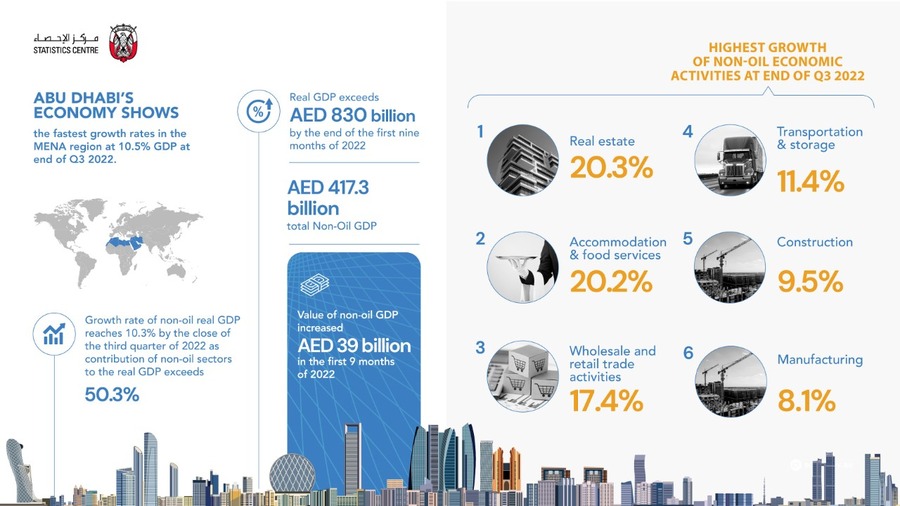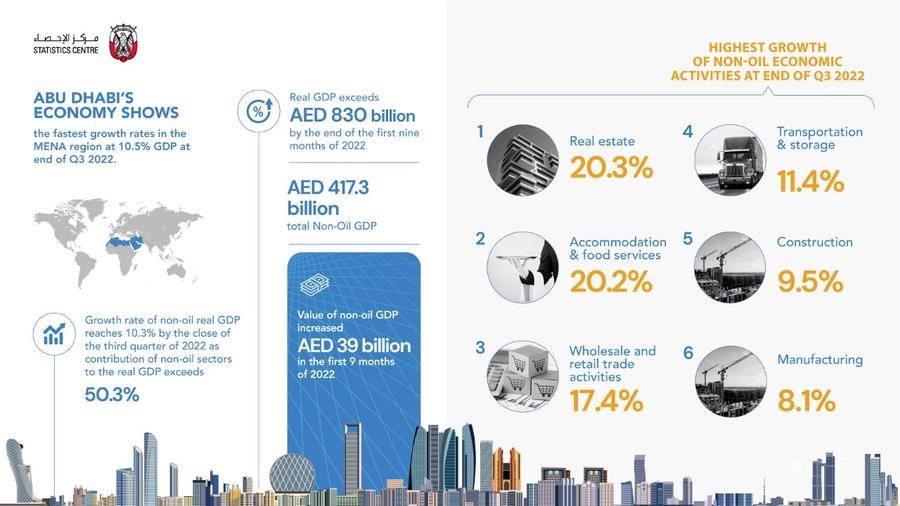
Abu Dhabi's Non-Oil Sector Takes Majority Share In Q2 GDP

Abu Dhabi's economy expanded 3.8 percent in the second quarter of 2025, with non-oil activity growing by 6.6 percent and, for the first time in a second quarter, making up 56.8 percent of total GDP, according to figures released by the Statistics Centre – Abu Dhabi.
The emirate's real gross domestic product reached AED 306.3 billion in Q2, rising from the corresponding period in 2024. The non-oil economy reached AED 174.1 billion, touching a new high and helping solidify the diversification trajectory of Abu Dhabi.
Over the first half of 2025, Abu Dhabi recorded GDP of AED 597.4 billion, marking a 3.63 percent year-on-year increase. Non-oil sectors grew 6.37 percent to AED 337.6 billion, reinforcing their growing weight in the emirate's economic structure.
SCAD data show that manufacturing remained the largest non-oil contributor with AED 30.1 billion, representing 9.8 percent of total GDP and registering 3.1 percent growth year-on-year. Construction activity surged 9.7 percent, reaching AED 30 billion, aided in part by ambitious infrastructure and housing projects and innovations like the AI-powered Binaa platform, which has reduced permit times by up to 70 percent. Finance and insurance ventures expanded by 10.3 percent to AED 21.8 billion, while real estate rose 10.2 percent to AED 11.7 billion. The information and communications technology segment also registered strong gains, reaching AED 8.6 billion with a 6 percent uptrend.
Trade, logistics and professional services posted mixed but modest gains: wholesale and retail trade rose 1.6 percent, transport and storage gained 7.5 percent, utilities grew 12.5 percent, and arts, recreation and other services increased by 12 percent.
See also Primark charts UAE debut with three Dubai outletsAhmed Jasim Al Zaabi, Chairman of the Abu Dhabi Department of Economic Development, hailed the performance as validation of a“future-ready, globally competitive economy.” He pointed to key enablers including investment in infrastructure, a competitive business environment, and strategic policies that bolster private sector growth.
Abdulla Gharib Alqemzi, Director-General of SCAD, added that that back-to-back record performances in Q1 and Q2 underscored the importance of timely, integrated data for policymaking. He noted that Abu Dhabi's AED 13 billion Digital Strategy, which aims to establish an AI-native government, places SCAD at the heart of transformation by providing foundational statistics across population, sectoral, and economic dimensions.
Analysts interpret the strong tilt toward non-oil sectors as a pivotal moment in Abu Dhabi's economic evolution. The fact that non-oil activity now constitutes more than half of GDP in Q2 signals that diversification policies are moving into structural territory rather than relying on cyclical trends.
That said, challenges persist. Non-oil sectors remain exposed to global demand swings, supply chain pressures, and talent shortages. Observers caution that sustaining double-digit growth in areas like construction or finance may require continuous regulatory adaptation and private sector confidence.
Notice an issue? Arabian Post strives to deliver the most accurate and reliable information to its readers. If you believe you have identified an error or inconsistency in this article, please don't hesitate to contact our editorial team at editor[at]thearabianpost[dot]com . We are committed to promptly addressing any concerns and ensuring the highest level of journalistic integrity. Legal Disclaimer:
MENAFN provides the
information “as is” without warranty of any kind. We do not accept
any responsibility or liability for the accuracy, content, images,
videos, licenses, completeness, legality, or reliability of the information
contained in this article. If you have any complaints or copyright
issues related to this article, kindly contact the provider above.


















Comments
No comment